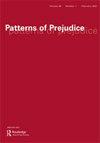3 Public objects of remembering and forgetting in contemporary Spain
IF 0.8
2区 社会学
Q4 ETHNIC STUDIES
引用次数: 0
Abstract
ABSTRACT Richards’s article is a reflection on comparative history inspired by the pulling down of the statue of the slave-trader Edward Colston in Bristol in June 2020. It explores the evolution in Spain of state policies and civil society activism to do with public spaces and symbolic objects related to the Spanish Civil War and the Franco dictatorship. First, the performative element of the Bristol protest invites analogy with celebrations in public spaces of the arrival through the ballot box in 1931 of the reforming Second Republic, a democratic regime subsequently overthrown in the civil war. Second, the dialectic of remembering and forgetting British imperialism and the slave trade is compared to the struggle to make the past visible in post-war Spain in the twentieth and twenty-first centuries. Bringing the concealed past into open discourse in Spain through civil society activism since 2000 has been focused on three elements: making public the affective consequence of significant objects; gaining the support of politicians with access to the state; and broadening youthful activism to encompass supranational needs based on human rights and the environment. The argument is that conflict over collective memory in the twenty-first century is largely one between backward-looking narratives of the nation and forward-oriented ideas and practices that eclipse the national by linking the local and the global.3当代西班牙记忆和遗忘的公共对象
理查兹的这篇文章是受2020年6月布里斯托尔奴隶贩子爱德华·科尔斯顿雕像被推倒的启发,对比较历史进行的反思。它探讨了西班牙国家政策的演变,以及与西班牙内战和佛朗哥独裁统治有关的公共空间和b符号对象的公民社会活动。首先,布里斯托尔抗议活动的表演元素,让人联想到1931年在公共场所庆祝改革中的第二共和国(Second Republic)通过投票箱诞生,这个民主政权随后在内战中被推翻。其次,将记忆和遗忘英帝国主义和奴隶贸易的辩证法与二十世纪和二十一世纪战后西班牙的历史斗争进行比较。自2000年以来,西班牙通过公民社会活动将被隐藏的过去带入公开的话语,主要集中在三个方面:将重要物品的情感后果公诸于众;获得与政府有关系的政客的支持;扩大青年行动主义,以涵盖基于人权和环境的超国家需求。他们的观点是,在21世纪,围绕集体记忆的冲突在很大程度上是关于国家的向后看的叙述与前瞻性的思想和实践之间的冲突,后者通过将地方和全球联系起来,使国家黯然失色。
本文章由计算机程序翻译,如有差异,请以英文原文为准。
求助全文
约1分钟内获得全文
求助全文
来源期刊

Patterns of Prejudice
Multiple-
CiteScore
2.50
自引率
0.00%
发文量
11
期刊介绍:
Patterns of Prejudice provides a forum for exploring the historical roots and contemporary varieties of social exclusion and the demonization or stigmatisation of the Other. It probes the language and construction of "race", nation, colour, and ethnicity, as well as the linkages between these categories. It encourages discussion of issues at the top of the public policy agenda, such as asylum, immigration, hate crimes and citizenship. As none of these issues are confined to any one region, Patterns of Prejudice maintains a global optic, at the same time as scrutinizing intensely the history and development of intolerance and chauvinism in the United States and Europe, both East and West.
 求助内容:
求助内容: 应助结果提醒方式:
应助结果提醒方式:


